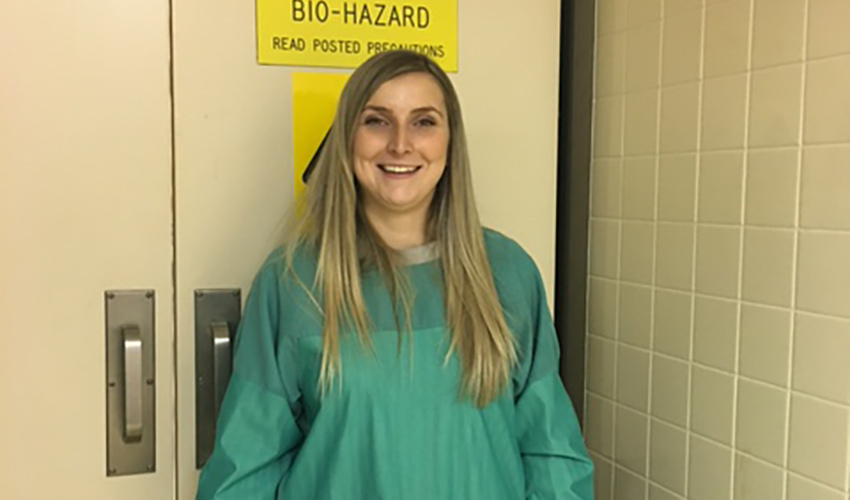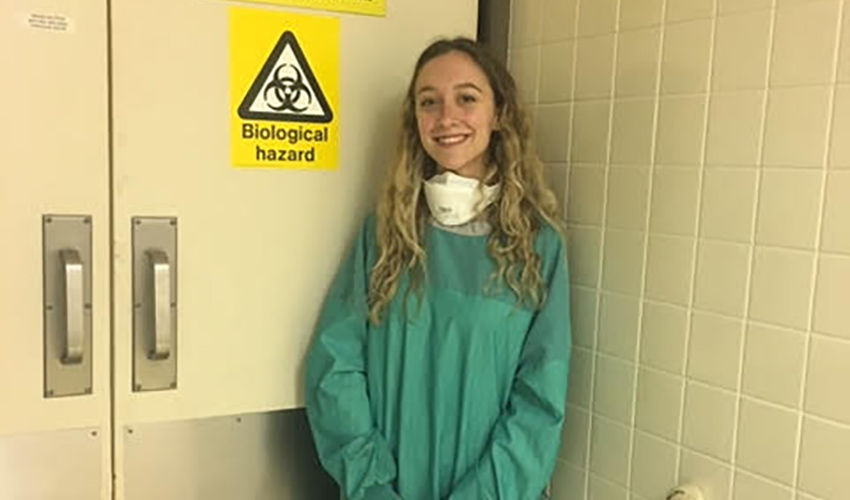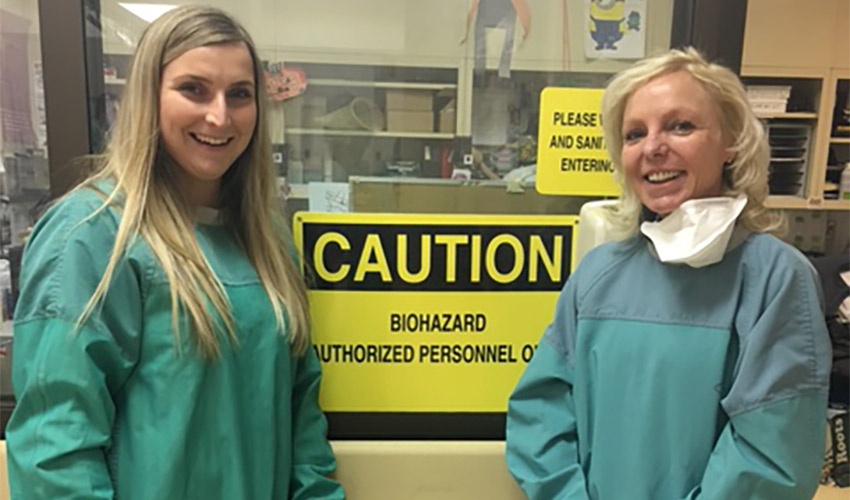MRU criminal justice grads finding employment in unique field
Practicum placements examining death offer new perspectives
— Mount Royal University | Posted: October 20, 2022

Alumna Taylor Dube-Mather completed her practicum with the Office of the Chief Medical Examiner and is now working on her thesis for her master’s.
Most students in Mount Royal’s Bachelor of Arts — Criminal Justice major anticipate a career in law enforcement or within the court system. However, some are discovering an entirely different path thanks to a unique practicum opportunity: working in the Office of the Chief Medical Examiner (ME).
The partnership with the ME’s office started in 2017, and since then 10 students have completed practicums there, with three accepting paid positions upon graduation.
For Professor Janne Holmgren, PhD, who oversees the partnership along with academic advisor and practicum coordinator Leann Acheson, seeing students turn into employees for such a highly coveted position is truly remarkable.
“I love it. It’s not often that we get to follow our students for years. One student has been there for over three years and I get to see them on a continuing basis. It’s so neat. The first time I watched one do a full autopsy it was like, ‘Wow, this is amazing,’ ” Holmgren says, who often sees former students as she is in and out of the ME’s office.
She recalls a time recently when there were multiple MRU grads in one room at the northwest office.
“There were two students who had been hired and were working there and then I brought down a new practicum student. And then, we were receiving a body that was coming in and the person doing that was a graduate of the Funeral Service Diploma program. There were maybe ten of us in the building, and five of us were from MRU.”
According to Holmgren, dozens of people apply for such a role in the ME’s office, so the fact that these jobs are being offered to MRU grads shows not only the quality of the education they receive, but also the calibre of the students.
Those who want to apply are rigorously screened, Holmgren says, who notes that they must also display a high level of maturity and professionalism.

Alumna Chloe Gabriele graduated in 2020 after completing her practicum with the Office of the Chief Medical Examiner.
“I work as a facilitator, I’m a support person with them. I watch their body language to see how they are reacting.You know sometimes the smells are really, really bad, because we’re dealing with decomposed bodies, which don’t smell very nice,” she says, noting that this is the first time seeing a dead body for many students.
Although, it’s important to note that students are not immediately responsible for doing autopsies.
“A lot of their role initially is stocking, entering data, watching and asking questions, helping clean up, helping taking x-rays and MRIs, all that kind of stuff. They ease into it.”
But by the end of their four months, students are able to do some more hands-on tasks, something alumna Chloe Gabriele can attest to.
“It wasn’t like you were standing in the background just watching or being an assistant. You were really involved. The investigators let me be on scene, not just watching them, but they gave me gloves and had me help out,” she says, recalling a memory of her practicum when an investigator asked her what she thought about a scene.
She graduated in 2020 after completing her practicum with the ME’s office.
For Gabriele, even though she did not go on to work in the field of death investigations, doing her practicum at the ME’s office completely changed her career course.
“I was planning on going to law school and being a lawyer and halfway through being at the medical examiner's office, I was like, ‘No I don’t want to do that anymore. I want to do more hands-on stuff, more direct things with victims.’ ”

Mount Royal University Alumna Taylor Dube-Mather and Professor Janne Holmgren, PhD.
Gabriele is currently working as a civilian officer for a Canadian police agency and is hoping to eventually become a crime scene investigator. Her experience gave her a whole new perspective, she says, adding that it was her favourite job she has ever had.
“For me, the best part was finding an answer to what happened to this person so we can bring closure to their families.”
Taylor Dube-Mather is another alumna who did her practicum with the ME’s office and is currently working on her thesis for her master’s.
She says before entering into her practicum she was working in a halfway house and was set on being a parole officer, but her time in the ME’s office opened her eyes to an entirely new range of careers.
“Being in corrections is great, but forensic science is very interesting and every day is always different. I think this really opened my eyes and changed my whole career trajectory. I still love corrections, but I don’t consider that for my future. I think this really shifted who I am and the way I think about things and the world.”
While Dube-Mather isn’t completely sure what her future holds, she knows it will involve death investigations in some capacity. Her experience in the ME’s office left her with a lot of empathy for those around her, something she says she is “extremely grateful for.”
Holmgren knows this particular practicum is a life-changing experience for students, whether or not they end up working in the field. She says she has been called as a reference for students and many employers are shocked to find out that the students have this kind of experience.
She also points out the benefits this practicum has for students such as Dube-Mather who choose to go to graduate school and who was able to work in Simon Fraser University’s forensic lab thanks to what she had already accomplished through MRU.
‘Criminal justice is a unique degree,” says associate professor Kari Roberts, PhD, chair of the Department of Economics, Justice and Policy Studies. “This tells me it’s in high demand by students and also well respected out there in the community that we’ve had students in the criminal justice program be so successful in applying for these practicum spaces, applying in competition with students in other programs at other institutions.”

